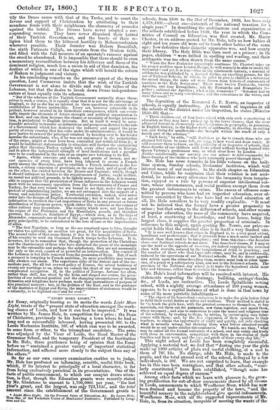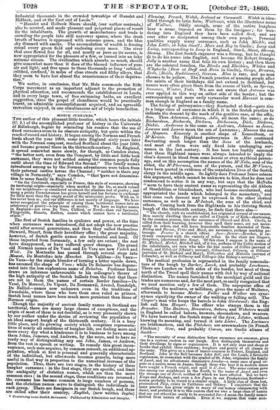"LIGHT MORE LIGHT."
Alf Essay, originally bearing as its motto the words Light More Light, treats of the "present state of education amongst the work- ing classes of Leeds, and how it can best be improved." It was written by Mr. James Hole, in competition for a prize ; the Dean of Chichester, previously to his leaving a town where he had so long and so successfully laboured, having presented 504 to the Leeds Mechanics Institute, 10/. of which sum was to be awarded, in some form or other, to the triumphant candidate. The prize was adjudged by the Vicar of Leeds, the Head Master of the Grammar School, and the temporary President of the institution to Mr. Hole, these gentlemen being of opinion that the Essay before us "contained a greater variety of important statistical information, azd adhered more closely to the subject than any of the others."
So far as our own cursory examination enables us to judge, Mr. Hole has produced an informing, sensible useful little book, which, if its interest be principally of a local character, is far from being exclusively parochial in its presentations. One of the feats of public concernment, to which our essayist draws atten- tion, is that, though the Education grants were recently stated by Mr. Gladstone to amount to 1,700,000/. per year, "the last year's grant, and the luygest, was only 723,115/., and the total amount since the establishment of the Government grants to • Light More LigAt. Cla the Present State of Education, &c. By fames Hole, Hon. Sec. of the Yorkshire Union of Mechanics' Institutes. Published by Long. =an and Co. schools, from 1839 to the 31st of December, 1869, has been only 4,378,1834—about one-sixteenth of the national taxation for a single year." In describing the architecture and organization of the schools established before 1839, the year in which the Com- mittee of Council on Education was first created, Mr. Harry Chester, in an address quoted by Mr. Hole, tells us how babies of eight and ten years old were set to teach other babies of the same age ; how defective their didactic apparatus was, and how scanty their library. The Holy Bible was then used as a primer ; in its pages, children " were drilled in spelling and reading, and their arithmetic was too often drawn from the same source."
" When the New Zealander (amusingly continues Mr. Chester) takes up his proper position upon London Bridge he will scarcely be able to credit the statement—and yet it is true—thut in the nineteenth century, a manual of arithmetic was published by a learued divine, an excellent person, for the use of National Schools, in which, in order to give to children a reverence for sacred things, the sums set were drawn from historical statements of numbers in the Holy Scriptures ! There were twelve Patriarchs, twelve Apostles, and four Evangelists ; add the Patriarchs and Evangelists to- gether; subtract the Apostles ; what is the remainder?' ' Solomon had so many wives and so many concubines ; add the concubines to the wives, and state the result !' " The deposition of the Reverend J. P. Norris, an inspector of schools, is equally instructive. As the result of inquiries in all the schools of the district under his inspection, ho states (Minutes 1850-60) that- " Three children out of four leave school with only such a smattering ot education as they may have picked up in the lower classes; that the more advanced lessons in elementary schools—lessons in geography, in grammar, in English history, in the higher parts of arithmetic in drawing, in cutting out, and fixing for needlework—are brought within the reach of only a fourth part of the scholars."
"Such facts," he adds, "will doubtless go far to console those who are alarmed lest there be none left, ere long, to hew wood and draw water. It will reassure them to know, on the authority of an inspector of schools, that three-fourths of our children still leave school without having learned who Queen Victoria's predecessor was or what river flows by London Feither intellectually nor morally can our school,v be held responsible for three-fourths of the children who have nomivally passed through them." Mr. Hole has some remarks in his little volume on the half- time system, Sunday schools, Mechanics' institutes, which will interest many of our readers. In the sixth chapter on Education and Crime, while he maintains that their relation is not acci- dental, he makes ewery allowance for the immunity from tempta- tion, enjoyed as a rule by persons of superior intellectual cul- ture, whose circumstances, and social position exempt them from the greatest inducements to crime. The excess of offences com- mitted, by persons who have had an imperfect education, over of- ' fences committed by those who have had no school education at all, Mr. Hole considers to be very readily explicable. "It must not be inferred that the former have a greater propensity to crime ; but that owing to the diffusionof schools, anclother means of popular education, the mass of the community have acquired, at least, a smattering of knowledge, and that -hence, being the largest class, it supplies the greater proportion of criminals. In reference to this subject, again quoting Mr. Norris, our prize-es- sayist holds that the criminal class is in itself a very limited one. "It is now well known that crime in England is, to a very great extent, hereditary and professional ; that it proceeds from a much more limited and distinct class than used to be imagined ; and from this class—the honwkss class—our National schools do not draw. The homebred dame*, if I may so use the word as the opposite of homeles,s, are indeed supplying the criminal class with recruits, seduced by the temptations of drink or poaching ; and the number of those who thus lapse into crime may be, and is confessedly, reduced by the operations of our National sehoOls. But fbr direct aggres- sive action upon the crime-breeding class, society must look to other agen- cies, of a penal or a reformatory kind, and sot to the National schools. The province of the National day school is to make the homebred child more wize and virtuous, rather than to reclaim the homeless."
Mr. Hole's local information will be received with interest. Ms statements respecting the drainage, building, saving.s'-banks, &c., of Leeds, are instructive. The Leeds Spitalfields sewing school, with a nightly average attendance of 200 young women, appears to be a capital instance of what is done in that town by some of its more patriotic inhabitants- " The object of its benevolent conductors is to make the girls better fitted to fulfil their social duties as wives and mothers. Their method is stated to be 'to teach the girls how, with the greatest economy to themselves, to buy materials, out them out for garments, sew them together, and mend them, when necessary; and also to endeavour to raise the moral and religious tone of the scholars, by reading to them, by advice, by eucouraging easy inter- course with them; and, by the free expression of their Qpinzons to their teachers, to obtain the opportunity of easily and quietly, not only checking what is actually wrong, but showing them what better educated pee* would do or say under similar circumstances.' We banish, say they, what may be called all the formal restraints of a wheel, and mix easily and freely with them in conversation, sympas bin with them in the stories of their families and their work, and the joys and griefs of their every-day life.'" This night school at Leeds has been completely successful. Applying a material test, we find that "during one year the girls made up 1300 articles of plain and useful clothing, at a cost to them of 78/. 13s. No charge, adds Mr. Hole, is made to the pupils, and the total annual cost of the school, defrayed by a few individuals, is 501. We are not surprised to learn, that example has in this case been contagious, and that other schools, "simi- larly constituted," have been established, " though. none has achieved an equal degree of success." Among other facts which we learn with pleasure is, the grow- ing predilection for out-of-door amusements shared by all classes in Leeds, amusements to which Woodhouse Moor, which hs,s now been drained and become the property of the town, " and the beautiful scenery in the neighbourhood give .special inducements. Woodhouse Moor, with all the suggested improvements of Mr. Hole, is, from its situation, incapable of meeting the wants of the
industrial thousands in the crowded townships of Ilunslet and Hblbeek, and at the East end of Leeds." -,
,‘‘ Hunslet and Holbeek Moors, should, (our author oontends,) nisi:elm, secured, and made pleasant and perpetual places of resort 'ffir'the inhabitants. The growth. of manufactures and trade. is OrOWding the people into still narrower spaces, where the- fresh breath of heaven is oppressed with noisome-gases, and the blue sky 'dimmed with smoke. The accumulation of wealth is fenoing round every green 'field and enclosing every Moor. The river that oncellowed free for - all, and nearly as pure as its source, is now appropriated for .the pleasure of a few, or turned into an inky noisome stream. The civilization which absorbs so much', should giVe-somewhat More than it does Of the -blesseci, influence of pure air and light; and free space to those thousands so lone.° cabined, Cribbed, confined,' in miles of close streets' and' filthy alleys, that they semi to: have lost almost the eenscionsiess of their depriva-
tion." . _ _
We notice, in - conclusion, that Mr. Hole commends the Rifle Corps movement as an important adjunet to the promotion Of physical ea-nation, and recommends the establishment in Leeds, and in every large town, of free aimmingbaths an exeellent suggestion, since the. gospel of cleanliness Would 'be pradieally learnt, an adinirable 'actioraplishment acquired, and an agreeable recreation enjoyed, in one simultaneous act of triple benefaction.



























 Previous page
Previous page